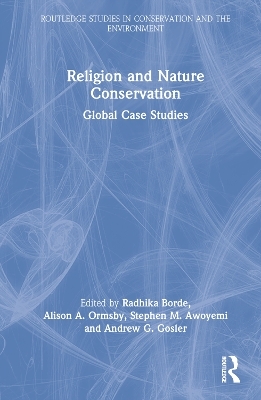
Religion and Nature Conservation
Routledge (Verlag)
978-1-032-15900-3 (ISBN)
With conservation and religion often being championed as allies in the quest for a sustainable world where humans and nature flourish, this book provides a much-needed compendium of detailed examples where religion and conservation science have been brought together. Case studies cover a variety of religions, faiths and practices, including traditional, Indigenous, Buddhism, Christianity, Hinduism, Islam, Jainism, Judaism, Shinto and Zoroastrianism. Importantly, this volume gives voice to the religious practitioners and adherents themselves. Beyond an exercise in anthropology, ethnobiology and comparative religion, the book is an applied work, seeking the answer to how in a world of nearly eight billion people, we might help our own species to prevent the extinction of life.
This book will be of great interest to students and scholars of nature conservation, environment and religion, cultural geography and ethnobiology, as well as practitioners and professionals working in conservation.
Radhika Borde (PhD) is a Lecturer at the School of Geography, University of Leeds, UK. She has published on sacred natural sites and sustainability and is a member of international professional associations working on these issues. She also supports local communities in India with conservation and sustainability projects. Alison A. Ormsby teaches Environmental Studies at the University of North Carolina Asheville, USA. She is a human ecologist with 30 years of experience working with people and protected areas, environmental education, and sacred natural sites. She has conducted research on sacred forests in Sierra Leone, Ghana, and India. Stephen M. Awoyemi is an Independent Researcher and past President of the Religion and Conservation Biology Working Group, Society for Conservation Biology. He holds a PhD from the Central European University (CEU), Austria. Andrew G. Gosler is a Professor of Ethno-ornithology in the Department of Zoology and School of Anthropology at the University of Oxford, UK. He is the author/editor of multiple books, including Ethno-Ornithology: Birds, Indigenous Peoples, Culture and Society (Routledge, 2011).
Part 1: Overview 1. Introduction Part 2: Examples of Faith-Based Conservation from around the World 2. Caring for the Land, Caring for the Dharma: The Environmental History of Buddhism at Pemayangtse Monastery, Sikkim, as a Resource for Contemporary Conservation Initiatives 3. Of Guardian deities and the wheel of life: How Buddhism shapes the conservation discourse in the Indian Trans-Himalayas 4. The Borgou and Its Spirits: Nature and the Traditional Faith Practice of the Baatɔnu People of West Africa 5. Reinterpreting beliefs and transforming ritual traditions around the Ganesh Festival in Pune, India 6. The conservation of Maleku people’s sacred natural sites in Costa Rica Part 3: Examining Themes in Faith-Based Conservation 7. Legitimating and Respecting Sacred Groves – Important for Human Rights and Important for conservation 8. Spiritual Values and Ecosystem Services of Sacred Groves in Karnataka, India 9. Ethiopian Orthodox Tewahedo Church Forests and Pollination Services across an Agricultural Landscape 10. Cultivating faith? Exploring the role of faith-based relationships in a Christian conservation agriculture programme in the Dakatcha Woodland, Kenya 11. Shinto shrine forests and happiness in Japan 12. Spiritual leaders build common ground: Enacting worldviews through legal pluralism in the face of neoliberalism Part 4: Broader Perspectives, Applications, and Challenges related to Faith-Based Conservation 13. International Human Rights Law Approaches in Support of Faith-Based Conservation Movements 14. Praying in Brazilian Protected Areas: From Conflicts to Potentials for Alliances between Nature Managers and Society 15. Faith in the West? Engaging Christian faith groups in conservation in ‘secular western societies’ 16. Hima, as protected area – opportunities and challenges in the 21st century 17. Birds as bridges between religions and people 18. Green Sabbaths: Putting the Anthropocene Era to Rest (Once a Week) 19. Religion and ecology walk hand in hand to conserve Greater Adjutants in Bihar, India Part 5: Last Glance 20. Additional Snapshots of Faith-Based Conservation 20a. A Twist in Central Asian Snow Leopard Conservation – Restoring Ancient Ceremony in support of Modern Conservation Methods 20b. Biocultural importance of sacred groves in Kurdistan, Iran 20c: Faith-based environmental action by Protestant churches in Singapore 20d: Guardians of the Heart of the World: Indigenous Cosmovision and Conservation of Colombia’s Sierra Nevada de Santa Marta 20e: Tu Be’Shvat – The Jewish festival of trees 20f: Case Study of Forest of Grace in Mongolia 20g: Jainism and Nature Conservation 20h: Faith and science directing A Rocha’s marine conservation work in Kenya 20i: Faith in Conservation in Papua New Guinea 20j. Vultures, Grief, and Interspecies Rituals 21. Epilogue
| Erscheinungsdatum | 13.10.2022 |
|---|---|
| Reihe/Serie | Routledge Studies in Conservation and the Environment |
| Zusatzinfo | 3 Tables, black and white; 7 Line drawings, black and white; 59 Halftones, black and white; 66 Illustrations, black and white |
| Verlagsort | London |
| Sprache | englisch |
| Maße | 156 x 234 mm |
| Gewicht | 660 g |
| Themenwelt | Naturwissenschaften ► Biologie ► Botanik |
| Naturwissenschaften ► Biologie ► Ökologie / Naturschutz | |
| Weitere Fachgebiete ► Land- / Forstwirtschaft / Fischerei | |
| ISBN-10 | 1-032-15900-6 / 1032159006 |
| ISBN-13 | 978-1-032-15900-3 / 9781032159003 |
| Zustand | Neuware |
| Informationen gemäß Produktsicherheitsverordnung (GPSR) | |
| Haben Sie eine Frage zum Produkt? |
aus dem Bereich


